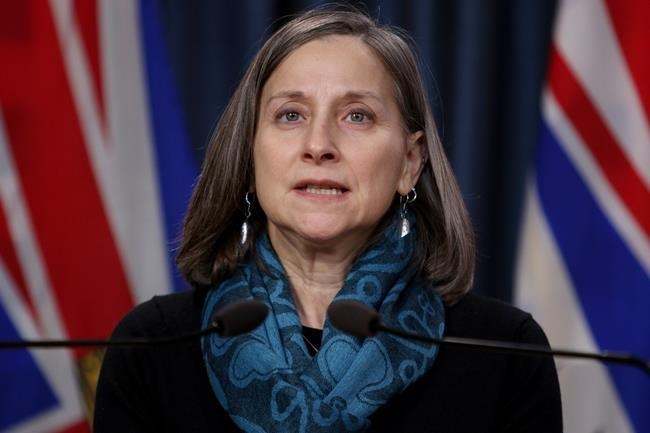
B.C. chief coroner Lisa Lapointe provides an update on illicit drug toxicity deaths in the province during a news conference at the legislature in Victoria on Monday, Feb. 24, 2020. THE CANADIAN PRESS/Chad Hipolito
Republished August 31, 2021 - 12:51 PM
Original Publication Date August 31, 2021 - 9:46 AM
VICTORIA - British Columbia needs a significant shift in how it treats people who use drugs, the province's chief coroner said Tuesday after releasing statistics showing 1,011 people died from suspected illicit overdoses from January to June.
It's the highest death toll recorded in the first six months of a calendar year during the province's overdose crisis. June was the ninth consecutive month during which at least 150 B.C. residents died as a result of the supply of toxic street drugs.
Chief coroner Lisa Lapointe said drug toxicity is now the leading cause of death in B.C. for people aged 19 to 39 and it remains the overall leading cause of unnatural death.
"This is a significant problem within our province, and the fact we come out here every six months and every year and the numbers keep going up and up and up, and no significant changes are being made, it's tremendously frustrating," she said.
Lapointe added that the safe supply program, where pharmaceutical drugs are prescribed as an alternative to illicit ones, needs to be expanded and given more support. The current program is a "step in the right direction," Lapointe said, but more is needed to discourage the illegal drug market.
"We don't have education for the public. Most of the public doesn't understand substance dependency. And it needs the public to understand, it needs the clinicians to understand," she told a news conference.
Lapointe said the deaths have taken a toll on staff at the coroners service, with front-line workers becoming disheartened by a lack of progress in stemming the rising numbers and leaving for other opportunities.
The COVID-19 pandemic has shown how governments and ministers can work together to tackle public health emergencies, Lapointe said, and it highlights how a similar approach is needed for overdoses.
Lapointe's comments were made on International Overdose Awareness Day, and Leslie McBain, the cofounder of the advocacy group Moms Stop the Harm, said various levels of government are "doing nothing and expecting things to improve."
"How many people must die before all levels of government have the courage, the sense of immediacy and the lack of stigma to say enough is enough?" McBain asked.
Brian Twaites, a paramedic specialist and advanced care paramedic with BC Emergency Health Services, said first responders have seen a dramatic rise in the number of daily suspected overdoses. The health service is dealing with an average of 100 overdoses a day, coinciding with an increase in the toxicity of the drugs being used, Twaites said.
"We're finding that we're having to give up to five times the regular dosing of Narcan just to get these people breathing on their own," he added. Narcan is the product name for naloxone, which is used to reverse the effects of substances such as fentanyl.
Sheila Malcolmson, the minister of mental health and addictions, said the effort against overdoses lost ground during the pandemic, but more lives would have been lost if there hadn't been more spending on addiction programs.
Malcolmson also said she disagrees that the government isn't treating the issue with the same urgency shown to the COVID-19 pandemic.
"I appreciate none of this is any comfort to someone who has lost a loved one, and that so many people continue to die from the toxic drug crisis shows we need to do more," she said in an interview. "We're working on doing that every day. It's not from a lack of political will."
More than 7,000 people have died since British Columbia declared a public health emergency in 2016 because of deaths related to illicit drugs.
— By Nick Wells in Vancouver.
This report by The Canadian Press was first published Aug. 31, 2021.
News from © The Canadian Press, 2021